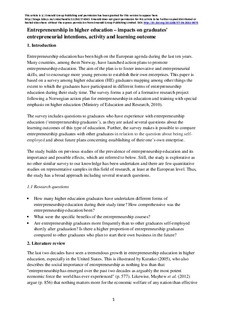Entrepreneurship in higher education - impacts on graduates' entrepreneurial intentions, activity and learning outcome
Journal article, Peer reviewed
Permanent lenke
http://hdl.handle.net/11250/274063Utgivelsesdato
2014Metadata
Vis full innførselSamlinger
Originalversjon
http://dx.doi.org/10.1108/ET-06-2014-0070Sammendrag
Purpose - The paper examines the proportion of HE graduates in Norway who have undertaken different forms of entrepreneurship education and how comprehensive the entrepreneurship education has been. The main purpose is to investigate the possible benefits and effects of entrepreneurship education in terms of learning outcome and the propensity to start their own business. Design/methodology/approach - A representative survey among higher education graduates (N=2827) is used to present reliable estimates on the prevalence of entrepreneurship education within HE. The study provides a comparison of entrepreneurship graduates with other graduates in terms of the propensity to establish their own business or planning to do so. The study also examines the learning outcomes of entrepreneurship education as the entrepreneurship graduates are asked several questions concerning this, e.g. whether it was useful for establishing own enterprise or whether it increased their creative and innovative abilities. Findings - The proportion of entrepreneurship graduates who are self-employed is very low and is not higher than for other graduates. The results indicate that entrepreneurship graduates to a certain extent are more interested in setting up their own company in the future, but this tendency is much lower than what is found in other European studies. Further, the reported learning outcome of the entrepreneurship education is not large. But entrepreneurship education, especially if it is of a certain type and scope, contributes to an increase in 'generic' entrepreneurial skills. Most entrepreneurship students participated in rather short entrepreneurship courses, with lesser benefit. Research limitations/implications - The positive effect of entrepreneurship education on the graduates’ future plans with respect to starting their own business may partly be subject to self-selection. Further, the quality of entrepreneurship education in terms of academic content and teaching and learning methods needs further attention. Practical implications - The overall results indicate that it would make more sense for some students to take a more comprehensive entrepreneurship education rather than that many more students taking some entrepreneurship education. This should be of interest to academia and policy makers. Further, it is primarily participation in education through (not about) entrepreneurship that increases the outcome in terms of generic entrepreneurial or innovative skills. This can be important information for the future development of entrepreneurship education. Originality/value - The effect of entrepreneurship education on graduates' entrepreneurial intentions is examined by use of a representative sample and when comparing entrepreneurship graduates with other graduates within the same fields and types of study. Thus, generalized conclusions can be drawn. The learning outcomes are measured when taking into account the length and type of entrepreneurship course.
Beskrivelse
This article is (c) Emerald Group Publishing and permission has been granted for this version to appear here http://brage.bibsys.no/xmlui/handle/11250/274063. Emerald does not grant permission for this article to be further copied/distributed or hosted elsewhere without the express permission from Emerald Group Publishing Limited.
